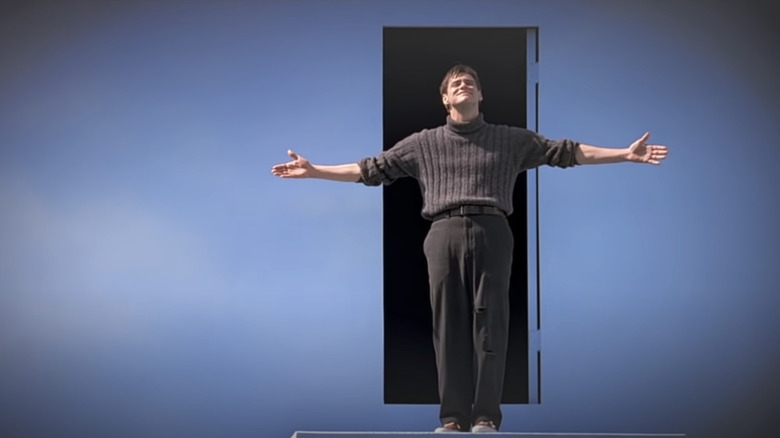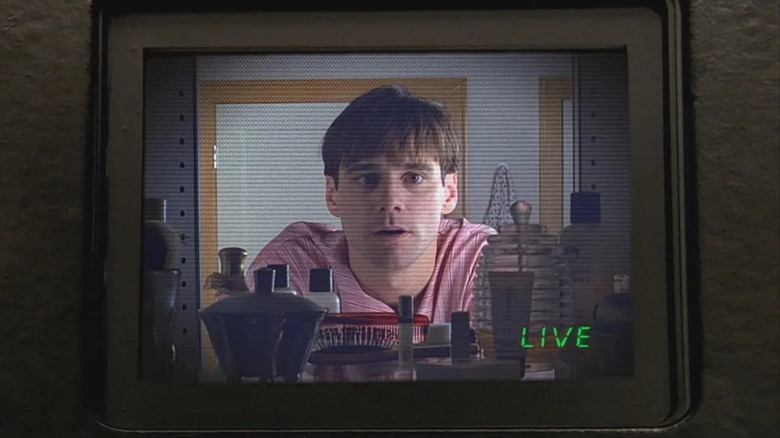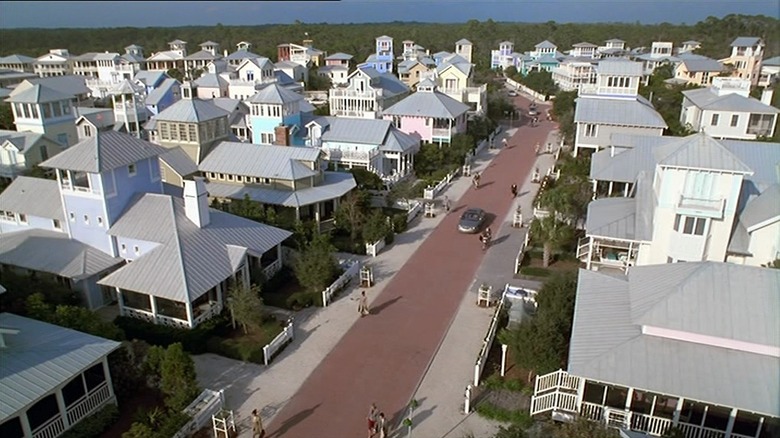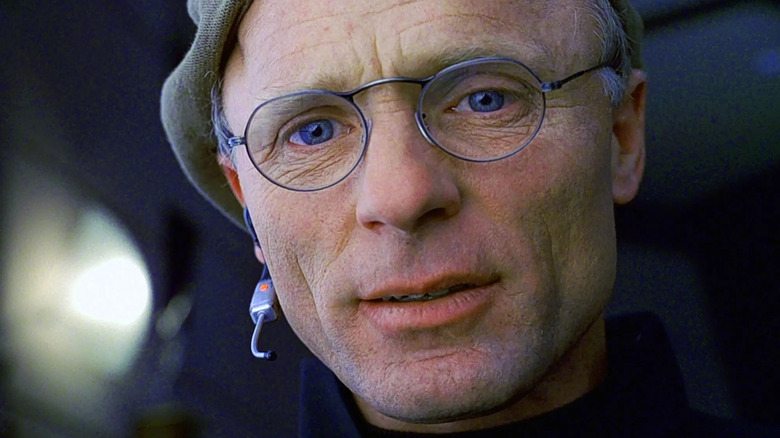The Truman Show Ending Explained: Freeing Yourself From Fear Of Reality
"The Truman Show" is a movie so high-concept that its title has become a colloquialism. The lead Truman Burbank (Jim Carrey) discovers that his life as he's known it for his 30 years is a lie. His hometown of Seahaven Island is contained within a dome, outfitted with complex camera and sound systems that document his life day-in-day-out. All of the town, his friends and family, acquaintances and strangers alike, are paid actors. What's the purpose? Truman is the star of the world's favorite TV program — The Truman Show.
Truman has an inkling something is wrong and this grows throughout the film. Despite the efforts of the show's crew and cast, he manages to escape the eye of the cameras and sets sail for the dome's border. The show's creator Christof (Ed Harris) attempts to convince Truman to stay, but his star takes a bow and walks out to an uncertain, but free, future.
Andrew Niccol's script takes aim at the TV industry and examines why audiences keep watching their favorite programs. Director Peter Weir, who as we've discussed before is the definition of a capable journeyman, directs with a deft hand, but lets the script speak for itself.
The script doesn't let theme take precedence either; the movie remains as focused on Truman as the in-universe show does. This character-first approach creates a story that's both a cautionary tale and delivers searing social commentary.
Comfortably rote
A useful tool in satire is to not exaggerate that much. Instead, take the subject and push it to its logical next step. That's what "The Truman Show" does for television. While television's content is inherently fake, the medium's entertainment value comes from spellbinding the audience with illusions so convincing that they forget that. In the world of "The Truman Show," that's no longer enough.
In the first line of the movie, Christof declares, "We've become bored with watching actors give us phony emotions." So, the next logical step is to add extra authenticity via a "real" main character who isn't played by an actor, who doesn't know he's on film, and whose personality, actions, and reactions are all genuine. Indeed, with remarkable prescience, "The Truman Show" premiered in 1998, just before the reality TV boom of the early aughts.
Why do the audiences of this world keep tuning into Truman? The same reason they watch TV in the real world. The series is "real" enough to be interesting but controlled and formulaic enough to be comforting. There's no true risk, only the illusion of it — which makes for a fun fantasy when we live lives full of risk and uncertainty.
Still, that attitude breeds indifference. Almost no one, barring the former extra/current "Free Truman" advocate Sylvia (Natascha McElhone), cares about the immorality of keeping a man caged because they love watching The Truman Show too much. Even after the grand finale, where Truman walks "off-stage," it's thirty seconds of cheering before they change the channel.
The rote routine of television also applies to Truman's place in the world as well. That's why his character arc is all about fear and risk.
Fear of the unknown
Truman's home of Seahaven Island is designed to be quaint, idyllic, and the perfect American suburb. So perfect, in fact, that no one would ever want to leave — and Truman hasn't, though not for lack of trying. In particular, he wants to go to Fiji because he believes that's where Sylvia is and he wants to see her again. However, everything around Truman is designed to discourage him; his peers always tell him to just enjoy his lot in life as is. He's had this dream for a long time but never fulfilled it because life kept getting in the way — who can't relate to that?
By the outset of the film, Truman's neighbors and observers are having more difficulty keeping him contained. Truman has come down with an early onset mid-life crisis. He feels he hasn't taken any risks and is eager to make up for lost time. However, it's not only external machinations he has to overcome.
Truman is afraid of water because his father "Kirk" (Brian Delate) "drowned" (i.e. was written off the show) in his childhood. Christof hoped this fear would further impede Truman's escape, since he has to ride a boat to escape the dome. Truman conquering his aquaphobia allows him to escape.
In Truman's continued attempts to escape to the real world, stymied but ultimately successful, the movie urges the viewers to do the same. Don't mistake complacency with a safe status quo for satisfaction. The world is more than just your bubble of it — so experience all it has to offer. You just have to overcome that little voice in your head telling you not to take risks. In Truman's case, that voice has a name: Christof.
Leaving the nest
Truman was born an unwanted child and became the first child ever adopted by a corporation. His "parents" in the show have only apathy for him. "Kirk" (real name Walter Moore) tries to break into the set because he misses the paycheck, not Truman.
The closest thing Truman has to a parent is Christof. This becomes clear in their first and last conversation, when Christof rattles off memories of Truman like a proud father: "I was watching when you were born, I was watching when you took your first step, I watched you on your first day of school, the episode when you lost your first tooth..."
Like any controlling parent, Christof thinks he's acting in Truman's best interest. He's built the "perfect" life for his "son" in Seahaven, never wanting for anything but excitement. Christof is of a kind with Mr. Perry (Kurtwood Smith) in Weir's previous film "Dead Poets Society" — denying his son a dream in the name of protecting him, and unwilling to see how his actions are harmful.
Truman not listening to Christof caps off his growth. Aware that he's being filmed, Truman utters his catchphrase one last time: "Good morning, and in case I don't see ya, good afternoon, good evening, and good night!" Doing so, he flips the words on their head. They were once reflective of his imprisonment but now signal him bowing out and ending his captivity.
We don't see what happens to Truman next. The show's over because its illusion has shattered and it doesn't have a star. It also isn't important; Truman's character arc is complete. We can guess he'll get together with Sylvia and go to Fiji, but what matters is that it will be his choice, and choices only matter when the outcome is unknown.



